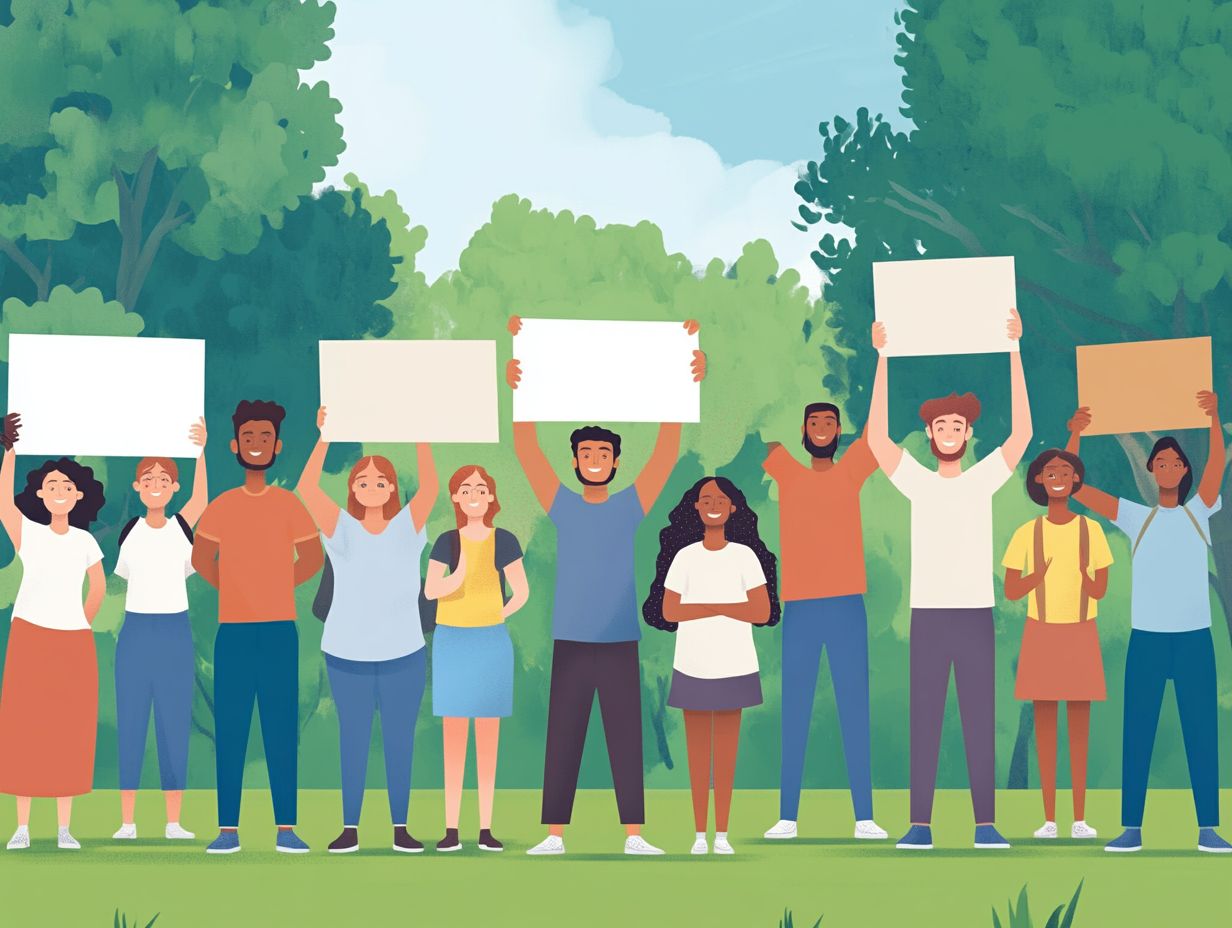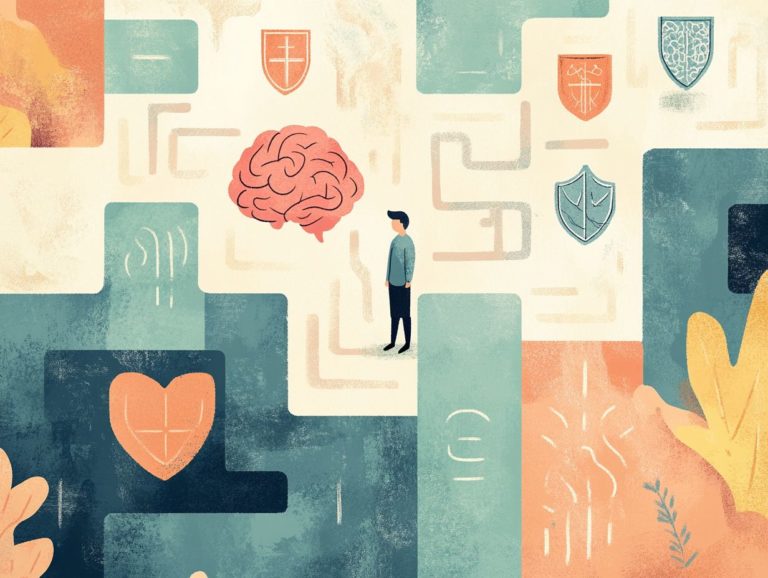Defensive Strategies for Hate Crimes
Hate crimes are a troubling reality that affects both individuals and communities. These crimes are driven by deep-seated prejudice and discrimination.
Grasping their definition and various forms is essential as you consider effective strategies for prevention and support. This discussion will illuminate the significance of education and awareness, the importance of reporting incidents, and the resources available for victims.
You ll also explore the legal frameworks established for prosecution. Crucial efforts are required to tackle the root causes of hate crimes. Let s unite now to create a more inclusive and compassionate society!
Contents
- Key Takeaways:
- Understanding Hate Crimes
- Preventing Hate Crimes
- Reporting Hate Crimes
- Supporting Victims of Hate Crimes
- Legal Action Against Hate Crimes
- Addressing Root Causes of Hate Crimes
- Preguntas Frecuentes
- Cu les son algunos ejemplos de estrategias de defensa para delitos de odio?
- C mo puedo protegerme de los delitos de odio?
- Qu debo hacer si soy testigo de un delito de odio?
- Qu recursos est n disponibles para las v ctimas de delitos de odio?
- Puedo defenderme en una situaci n de delito de odio?
- Qu pasos debo seguir para prevenir delitos de odio en mi comunidad?
Key Takeaways:

- Education and awareness stop hate crimes. Together, we can build communities that promote understanding.
- Reporting hate crimes is vital. It allows for legal action and shows that intolerance won’t be accepted.
- Support for victims is crucial. Encouraging them to report incidents is a key part of this support.
- We must confront root causes like prejudice. Challenging hateful beliefs helps create a more tolerant society.
Understanding Hate Crimes
Understanding hate crimes is crucial for fostering community cohesion. These crimes impose significant mental health repercussions on victims.
Hate crimes are defined as criminal acts driven by animosity toward specific groups. They take many forms, from physical violence and vandalism to verbal abuse.
The tragic shooting by Dylann Roof at Emanuel A.M.E. Church serves as a stark reminder of the very real and pervasive threats posed by hate groups.
According to the Southern Poverty Law Center and the FBI, these crimes have alarmingly increased across America. They are driven by prejudice against minority groups and identity-based motivations.
Definition and Types of Hate Crimes
Hate crimes can be categorized into various types, such as violent acts, vandalism, and verbal threats. All are driven by a deep-seated unacceptance toward specific groups.
These incidents can manifest as physical assaults targeting individuals based on their race, ethnicity, or sexual orientation. They can also include the defacement of property with hate symbols or slurs, leaving communities feeling vulnerable and unsafe.
The perpetrators of such crimes often take advantage of societal divisions. Their intent is to instill fear and propagate bigotry.
To combat this unsettling trend, cultivating a culture of tolerance and inclusion is essential. By encouraging open dialogue and fostering understanding among diverse communities, we can help dismantle the grip of hate.
Preventing Hate Crimes
Preventing hate crimes necessitates a united front. The fight against hate must be rooted in education and community engagement.
By fostering a diverse coalition, we can promote understanding and strengthen support among law enforcement and community members alike.
This collaborative approach is essential in creating a safer and more inclusive society.
Education and Awareness
Education and awareness serve as essential tools in the battle against hate crimes. They enable us to grasp and address the deeper issues of prejudice.
By engaging in discussions within schools and community centers, various educational programs encourage open dialogues about diversity and the consequences of intolerance.
Local initiatives often collaborate with community leaders who play a pivotal role in championing these educational efforts. They advocate for tolerance and shine a light on acts of kindness and solidarity that effectively challenge hateful ideologies.
Through workshops, seminars, and community events, these leaders foster a sense of togetherness. They reinforce the notion that compassion and understanding can be powerful counter-narratives to hate.
In this collaborative atmosphere, we recognize our responsibility in nurturing an inclusive society. Ultimately, this strengthens the bonds within our community.
Creating Inclusive Communities

Creating inclusive communities is essential for ensuring that minority groups feel safe and valued. This approach ultimately leads to a reduction in hate crimes. When individuals from diverse backgrounds come together, they create a rich tapestry of perspectives and experiences that nurture understanding and empathy.
We can enhance this collaboration by establishing dialogue platforms that encourage these communities to share their stories and challenges. Actively involving residents in local initiatives amplifies the voices of underrepresented groups and cultivates a genuine sense of belonging.
Join forces with others to create a strong community that embraces diversity. These efforts educate community members and play a significant role in reducing acts of intolerance and prejudice.
Reporting Hate Crimes
Reporting hate crimes is essential for understanding their prevalence and ensuring victims receive the protection they need.
By bringing these incidents to light, you contribute to the safety of individuals and address the significant mental health repercussions they impose on both individuals and communities.
How to Report and Why it Matters
Knowing how to report hate incidents is crucial. It empowers you and strengthens community responses to hate crimes. This process not only assists victims in pursuing justice but also fosters accountability and awareness within your community.
Start by gathering detailed information about the incident dates, times, locations, and any witnesses. Once you’ve collected this information, connect with local law enforcement agencies or organizations specializing in hate crimes.
Community leaders are invaluable in this process, offering guidance and support that can amplify voices that might otherwise remain unheard.
By reporting these incidents collectively, you contribute to greater awareness and understanding of the broader societal issues at play. This ultimately fosters social justice and unity among diverse communities.
Supporting Victims of Hate Crimes
Supporting victims of hate crimes is crucial for their healing and recovery. This support involves providing necessary resources and assistance while cultivating a community response grounded in tolerance and inclusion.
Resources and Assistance
Many resources can help you cope with the mental health effects of hate crimes and seek the support you deserve. These initiatives include specialized counseling services that create a safe space for processing trauma and emotional struggles.
You can also access legal aid to better understand your rights and navigate the often complex justice system. Community support initiatives, often led by local leaders, foster a sense of belonging and solidarity.
These gatherings provide emotional encouragement and offer practical resources, such as information on additional mental health services, workshops, and peer support groups. Together, these resources are vital for promoting healing and resilience as you move forward.
Legal Action Against Hate Crimes

Legal action against hate crimes is essential for achieving justice. Strong hate crime laws facilitate effective prosecution and ensure that offenders receive appropriate sentencing.
Prosecution and Sentencing
Prosecution and sentencing in hate crime cases hinge on hate crime laws and important teamwork between law enforcement agencies like the FBI and the U.S. Department of Justice. This partnership is essential for effective evidence gathering, which is crucial for successful convictions.
As an investigator, you must navigate the collection of physical evidence, witness statements, and digital footprints. It’s vital to uphold the rights of victims during this process.
Effective communication and robust support from law enforcement help victims feel safe. When victims feel secure, they are more likely to cooperate, leading to a stronger legal response.
Addressing Root Causes of Hate Crimes
To address the root causes of hate crimes, it s necessary to confront prejudice and discrimination. This requires cultivating community responses that encourage understanding and empathy.
Engaging in meaningful dialogue fosters connections. Together, we can create an environment where acceptance thrives and hatred fades.
Challenging Prejudice and Discrimination
Challenging prejudice and discrimination requires your active participation. Community leaders and organizations must work together to promote education, tolerance, and inclusion.
Efforts often take the form of educational programs. These initiatives equip individuals with the resources needed to dismantle harmful stereotypes and nurture empathy.
Community outreach initiatives, like workshops and seminars, bridge gaps between diverse groups. These gatherings promote dialogue and enhance understanding.
Your role as an influential leader is crucial. By setting examples and advocating for inclusive policies, you can create safe spaces for marginalized voices.
Your advocacy inspires collective action and fosters an atmosphere where acceptance flourishes. This ultimately leads to a more equitable society for everyone.
Preguntas Frecuentes
Cu les son algunos ejemplos de estrategias de defensa para delitos de odio?

Algunos ejemplos de estrategias de defensa para delitos de odio incluyen t cnicas de defensa personal, informar sobre incidentes a las autoridades y buscar apoyo de organizaciones comunitarias o grupos de apoyo.
C mo puedo protegerme de los delitos de odio?
Existen varias formas de protegerse de los delitos de odio, incluyendo estar consciente de su entorno, evitar situaciones confrontacionales y aprender t cnicas de defensa personal.
Qu debo hacer si soy testigo de un delito de odio?
Si eres testigo de un delito de odio, intenta llegar a un lugar seguro y llama a las autoridades de inmediato. No enfrentes al perpetrador y recopila la mayor cantidad de informaci n posible, como una descripci n del perpetrador y de cualquier testigo.
Qu recursos est n disponibles para las v ctimas de delitos de odio?
Hay muchos recursos disponibles para las v ctimas de delitos de odio, incluidos asistencia legal, servicios de consejer a y grupos de apoyo. Tambi n puedes informar sobre el incidente a las autoridades y buscar asistencia de organizaciones comunitarias.
Puedo defenderme en una situaci n de delito de odio?
S , tienes derecho a defenderte si eres v ctima de un delito de odio. Sin embargo, es importante evaluar la situaci n y tratar de desescalar si es posible. Si necesitas usar defensa personal f sica, aseg rate de hacerlo de manera segura y dentro de los l mites de la ley.
Qu pasos debo seguir para prevenir delitos de odio en mi comunidad?
Para prevenir delitos de odio en tu comunidad, puedes educarte a ti mismo y a otros sobre la diversidad y la tolerancia, apoyar la legislaci n contra los delitos de odio, y promover la inclusi n y la aceptaci n dentro de tu comunidad.






